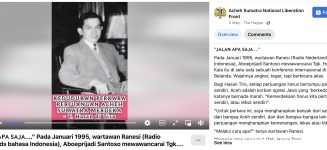After a total of 25 days of negotiating, the Helsinki talks on Aceh have reached a historic phase. For the first time, Indonesia is about to end its war with a separatist rebellion through a political settlement. Although the full details have yet to be disclosed, the deal, if successfully implemented, will be a milestone.
Three myths seem to have hampered a clear understanding of the talks on Aceh in Helsinki.
The first is the claim – to ease public acceptance of the peace talks – that these were just a series of “informal talks”.
Since any deal reached should be upheld by the parties, obviously it could hardly be informal– not least for the Crisis Management Initiative (CMI) chief, Martti Ahtisaari, who acted as facilitator. Indeed, a ceremony on Aug. 15 will bind Indonesia and the GAM (Free Aceh Movement) and, separately, between them and the European Union (EU) and ASEAN in two formal agreements.
The second myth is the view that the talks made Aceh an international issue. In fact, it has long been an international issue because of past human rights abuses and the tsunami. Whether Aceh could become another East Timor is beside the point.
The third and most widespread myth is the confusion about a “local political party”. Is it a party GAM wanted for itself, a number of local parties, or a party or parties Jakarta offered on its own terms? Crucially, which of these will be genuinely democratic, for example; fully addressing the aspirations of the Acehnese?
The Indonesian delegates initially came with a firm rejection of GAM’s demand for local parties and a bid offering GAM to nominate its candidates for local chiefs to be supported by 10 of the existing national parties in the next Aceh elections. GAM rejected that, calling it, “not transparent, and by special appointment”.
As Jakarta proposed an “Aceh-based national party”, the atmosphere improved, but the talks almost became deadlocked. A source close to the negotiations said, the insertion of the word “national” in a faxed message from Jakarta had caused much trouble. GAM resisted the conditions for political parties as stipulated by Law No. 31/2002. It took about 7 hours to discuss it at the July 16 session and lasted for 12 hours with 5 breaks and several calls to Jakarta. The latter was “the longest and toughest session we had”, RI chief delegate Hamid Awaluddin said.
Underlying the differences were the centralistic versus local approach to the matter. Indonesia had apparently taken for granted GAM’s February compromise to give up its demand for independence, ignoring, it seems, what should have since become obvious — that political participation was one of GAM’s key priorities. GAM wanted to have more parties for Aceh, while Jakarta — and most of the media for that matter — read it as GAM simply wanting a party for itself.
What is at stake here, Martti Ahtisaari told Radio Netherlands, is a principle of democracy. “No one argued, not least GAM, (to) want to have a political party of their own. The question was principled: anyone who wants to participate will have to be facilitated. There are existing parties already in Aceh and new ones will definitely come forward,” the CMI chief explained.
Thus, for GAM to accept the nomination of GAM candidates by Jakarta-based parties, they said, is “to corrupt a supposedly democratic process”. It would appear that GAM has suddenly changed from a rebel movement to a champion of democracy. But it has also been understood that it should be possible for Indonesia to introduce local parties without contradicting her Constitution that is based on the philosophy of the unitary state.
Both sides finally reformulated and made Jakarta’s proposal acceptable. The deal – agreeing in principle that Aceh will have local political parties – needs to be ratified by the Indonesian national legislature within a period of 18 months. Based on this pledge, both parties put their initials on the eight-page Memorandum of Understanding. It is the price Jakarta paid for GAM’s setting aside its independence demand.
The other basic commitment is the withdrawal of Indonesia’s non-organic troops and paramilitary police, in addition to the collection and destruction of GAM’s weapons within four months, from September to December. Former GAM members will be offered amnesty and reintegrated into Acehnese society.
The accord thus stands on key commitments on political participation and security arrangements. For two parties, burdened by a mutual distrust after three decades of war, the two commitments constitute a big promise.
Clearly the proof in the pudding will be in the eating. Promises are hard to sell in post-war Aceh. Provoked incidents like those in Langsa and Takengon in 2003 contributed to the failure of an accord. Observers, with East Timor violence in 1999 in mind, recall the difficulties for troops to retreat if and when at the same time they feel they have been cheated.
But, the tsunami has made many people press for the peace that so many locals have longed for no matter who has finally “won” the war. And the Army has been instructed to restrain itself. The EU-ASEAN monitoring team, marking Europe’s first peace mission in Asia, will have to watch and manage the development on the ground.
If the deal works, as it seems likely, it will be the first time in years that an internal armed conflict is resolved by a peaceful settlement. Since most rebellions, with much less popular support and arms – from the RMS in Maluku (1950), the Darul Islam (1950s), the PRRI-Permesta (late 1950s) to the OPM in Papua (since 1965) – were crushed by force, Aceh’s experience should be a huge lesson for Indonesia.
The accord will have implications for party oligarchies and some military businesses. It could push post-Soeharto reforms to forge ahead and revive Indonesia’s 1950s local democracy, even though federalism remains taboo.



